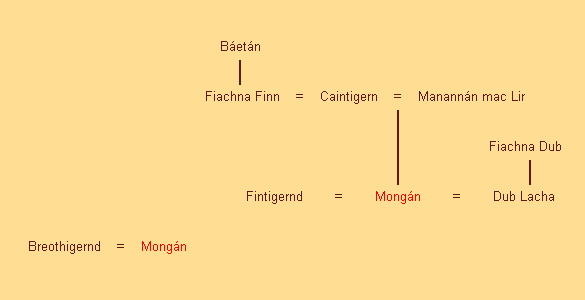Mongán
Poet and leader of the Dál nAraide. Mongán (Mongan) was said to be a historical figure, who died in c. AD 624.
Mongán (Mongan) was said to be the son the sea god Manannán Mac Lir and Caíntigern. Caíntigern was the wife of Fiachna Mac Báetáin. Fiachna Mac Báetáin was the king of Dál nAraide, a petty kingdom within Ulster.
There are three different versions of how Manannán conceived Mongan upon Caíntigern. In all three cases, Manannán would only help Fiachna in battle if he was allowed to sleep with Caíntigern.
Mongán lived in Tir Tairngire (the Land of Promise) with his father Manannán until he was twelve, before returning. At Tir Tairngire, he learned all the knowledge of the Tuatha De Danann. He also had the ability to change his shape into a deer, salmon, seal, swan or wolf.
As a young boy, Mongán foretold his own death as he walked along the beach with his mother. When Caíntigern heard that the beautiful stone she picked up from the sand would be the one that would kill him, she threw the stone as far as she could into the sea. Later that day however, the wave brought the stone back to the beach.
Mongán was married three times.
Mongán and his wife Fintigernd sought refuge from a hailstorm in a house with a bronze roof. The host gave him ale from seven vats that made him forget the world outside. Mongán sang and entertained his host with story after story. A whole year passed without him leaving the house.
At Ráth Mór, with a different wife named Breóthigernd, he got into a quarrel with a poet named Forgoll. Forgoll claimed that he had seen Fothad Airgthech killed. Mongán disputed Forgoll's claim of where and how Fothad had died. Forgoll threatened to satirise him and take his wife for his pleasure, if Mongán couldn't prove his own claim about Fothad's death after three days. The matter was settled on the third day when Cailte arrived, and testified about Fothad's death in favour of Mongán's claim.
Fiachna Mac Báetáin was known as Fiachna Finn, which means Fiachna the Fair. Fiachna Finn was a rival of Fiachna Dub (Fiachna the Dark). The two Fiachnas were engaged in a war, but Mongán fell in love with Dub Lacha, the beautiful daughter of Fiachna Dub. Dub Lacha was also in love with the son of her father's enemy. She exposed her breasts to young Mongán, and he took her as his wife.
Fiachna Finn (mac Báetáin) was winning all of the battles against his enemy, Fiachna Dub, because he had a kinsman named St Comgall who always prayed to his God for Fiachna Finn's victory. However, when Fiachna Dub called upon Comgall's favour, it left the saint in a dilemna. So Comgall asked Fiachna Finn if he preferred victories in battle but damnation in hell, or defeat in battle but eternal life in heaven. Fiachna Finn chose the second option, and was immediately defeated and killed in battle.
Mongán sought to avenge his father's death with the help of Brandub, king of Leinster. But Brandub exacted a heavy price for his help. The king wanted Dub Lacha as his price for his help. So Dub Lacha moved into Brandub's palace, but the king could not have sex with her until after a year of separation from her husband.
Mongán secretly visited his wife in various guises and continued to sleep with her. Brandub discovered Mongán's deception. Fearing that he would lose his wife, Mongán asked for help from an ugly witch named Cuimne. The hag used her powerful magic to change her shape so she looked like a beautiful princess from Munster. Mongán bargained with Brandub that he could have Cuimne in exchange for his wife's return. Brandub agreed, and gave Dub Lacha back to Mongán. Brandub was shocked when Cuimne returned to her original shape, as a hag.
A few sources said that he had children, but one text said that he died childless. Mongán had another confrontation with another poet named Eochaid Éigeas. Eochaid served as chief poet of Ulster. Mongán foolishly challenged Eochaid to a contest, which Eochaid lost. Eochaid Éigeas angrily cursed Mongán that he would be sterile.
In the battle against the Britons, Mongán decisively defeated the invaders, but Artur ap Bicior picked up a coloured stone and hurled it at Mongán's head. As he had foretold earlier to his mother, he was killed with the same stone that his mother had found and discarded.
Related Information
Name
Mongán, Mongan.
Sources
Toruigheacht Duibhe Lacha Laimh-ghile (The Pursuit of Dubh Lacha of the White Arms).
Immram Brain (The Voyage of Bran).
Annals of the Four Masters was written in 1636.
Related Articles
By Jimmy Joe


